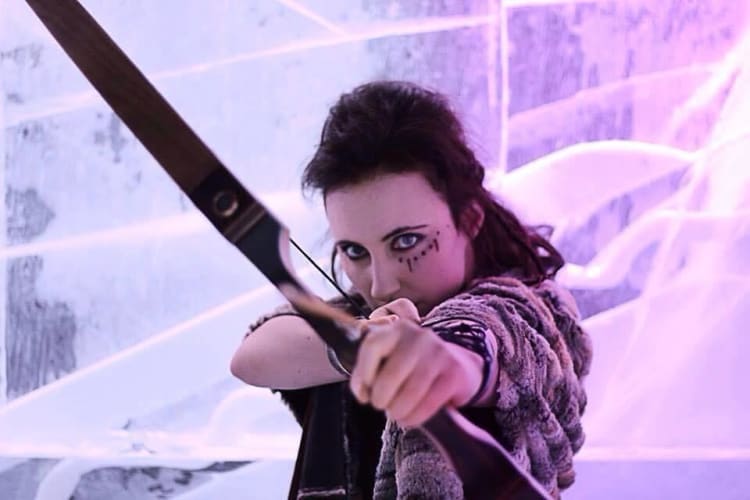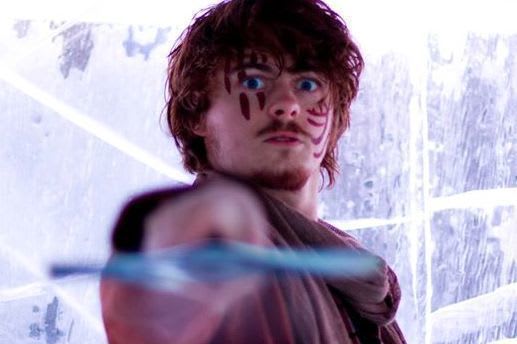One of Ibsen’s early historical plays, The Vikings of Helgeland was written in 1858 and performed the following year at the Christiana Theatre when Ibsen became director there.
Those interested in theatre history will probably have heard of it because Edward Gordon Craig directed a production in 1903, paid for by his mother Ellen Terry who played the dominant role of warlike Hjordis.
It's very different from the plays for which most people know him: a tale based on old Nordic sagas. Few people have read it and it is unlikely that anyone alive has ever seen a British production for, according to Firstborn’s publicity, theirs is the first London staging for over 80 years. That makes it very interesting as a curiosity, but is it interesting as a play?
Well, er, yes. This pared-down production cannot begin, and doesn’t try, to offer the kind of production Ibsen probably originally intended with its Wagner-like effects that end in a great ride through the sky to Valhalla. I suspect that, given that kind of realist operatic staging, it would seem awkwardly stodgy.
Director Antonio Ferrara and his designer Caitlin Abbot here represent the settlement on the coast of Norway, just below the Arctic Circle, where Viking Gunnar has his great feasting hall with simple structures of wooden pallets. Weaponry, fur pelts and braided hair and bordered garments for the women suggest the 10th century, at the time of Eric the Blood-Axe.
This is a land and time of legend and, with the use of live flame and music, they stimulate the imagination. More difficult to interpret are the meanings of the red patterns drawn on faces. On women, dots above or below the eyes; on men, what could be scar patterns or symbolic hatchings—on one man they could be dripping blood. Are these some kind of tribal markings?
It is much more difficult to make the text seem as imaginative. There is no translator credited but there is a mixture of modernisms and 19th century that doesn’t always sit easily or help delivery, though adapting Scots accents to give a Celtic feel disguises this a little.
There are some strong performances, but it is difficult to take these sword-wielding warriors entirely seriously. Ibsen at times seems to be trying out a much more domestic drama than the saga story that frames it.
Roseanne Lynch is the dominant and manipulative Hjordis (especially telling sitting silently weaving a bow string from her hair). She and Fergus Leathem as her husband Gunnar handle this rather self-conscious dialogue with confidence. Emma Kemp is contrastingly gentle as Dagny, wife of the more dynamic Sigurd (Harry Anton), blood brother of Gunnar.
The back-story, explained by Dagny’s father Ornulf, is that five years ago, on a visit (or was it a raid) to Ornulf’s territory on Iceland, Sigurd and Gunnar carried off an abducted Dagny and a more willing Hjordis. Now Ornulf is looking for his daughter and recompense.
John McLear presents an Ornulf closer to the bluff fighter than the younger warriors. Uncomfortable in diplomacy, he shouts for emphasis but later effectively makes the audience concentrate for one important passage by lowering his voice, though, when the speech grows over lengthy speech, he slows the pace so much it undoes the whole effect.
The plot centres on honour and loyalties, on valour and a lie. The revelation of a secret between Sigurd and Gunnar brings disaster. There are rapid changes of alliances as peaceful relations are disrupted.
Neither play nor production give much sense of time passing. Revenge killings and confrontations come in such rapid succession that they seem contrived. The feud-like family saga is given little context; perhaps Ibsen expected crowd scenes to show how events affected not just individuals but whole clans.
Key moments that lead to tragedy, one past described and one live-happening, are acted out in sharp-imaged shadow-play, but some puppet work is less effective and Ibsen's dramatic finale is a huge challenge. The glories of Valhalla are not part of modern consciousness and imagination; to create the impact of Hjordis's final apotheosis would be a challenge even with unlimited resources.
Firstborn Theatre has done a service in staging this revival of a play so long neglected. It is fascinating to see some of the themes of Ibsen’s later plays appearing in this piece of Viking saga.
Grab the chance to see it if you take an interest in Ibsen’s work or want to see what attracted Craig; it may be a long time before you get another chance to do so.

